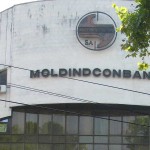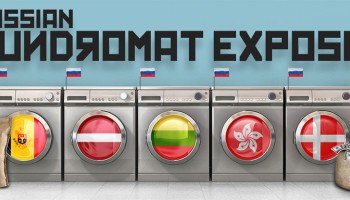Russia’s dirty laundry has been put out to dry by investigative reporters working together across 32 countries in a major project led by the Organized Crime and Corruption Reporting Project (OCCRP) and Moscow-based Novaya Gazeta.
Three years ago, OCCRP’s network of reporters discovered the Russian Laundromat, through which more than US$ 20 billion stolen from the Russian government by corrupt politicians or earned by organized crime groups was laundered through a series of ghost companies.
Obtaining new transaction details from an anonymous source, journalists sifted through thousands of transactions from Moldindconbank in Moldova and Trasta Komercbanka in Latvia. They discovered where the money went and exposed those who profited from the Laundromat, knowingly or unknowingly.
Whose money is this?
Some of the money came from organized crime groups but a significant amount seems to have come from the Russian Treasury.
In other words, hard-working Russians paid billions in taxes while putting up with snail-paced trains, potholes and a health care system dying a slow death.
The Laundromat was spinning full time when in 2013 the Russian Ministry of Transport estimated that Russia’s economic output could be nearly 10% higher if it improved its poor roads.
Tax money was disappearing into the maze of shell company accounts or being blown away on luxuries at a time when the state statistic showed that in 2015 nearly 20 million Russians were living below the poverty line. This was a 20% increase in poverty compared to 2014.
“A trillion dollars is flowing from poor countries to rich countries each year. That's money that could be alleviating poverty and building infrastructure. Instead, it sits as overpriced, high end real estate in London and New York,” said OCCRP founder and chief editor, Drew Sullivan.
Within 24 hours of the story being published by OCCRP and its partners, the story was republished by major news outlets across the world including Deutsche Welle, Bloomberg, the Financial Times, and Reuters. Oxfam International has called on European governments to “have publicly accessible registers of beneficial owners and to envisage the withdrawal of banks' business licenses when they are found to be facilitating money laundering.” Across Europe political officials, the beneficiaries, and the banks themselves were provoked to respond.
Politicians respond
In the UK, the Green Party responded to the story by challenging governments to eradicate money laundering. Simon Kirby, a member of Parliament, was forced to address an urgent question about the role British banks played in the Laundromat scheme and announced the Financial Conduct Authority (FCA) and the National Crime Agency (NCA) would investigate the allegations.
The Swiss financial watchdog FINMA (Financial Market Supervisory Authority) said it is looking to 45 Swiss banks that may have been involved in the Laundromat.
Reacting to the news, Danish Prime Minister Lars Loekke Rasmussen on Tuesday called the money laundering a disgrace. "It makes me sad and angry," he told Denmark's TV2.
OCCRP partner Sarunas Cerniauskas has launched a social media campaign in Lithuania to urge change in the prosecution of corruption, and the campaign has already attracted two members of parliament who said they are going to register amendments to the law in order to increase the fines as soon as possible.
The Director of the Finance Ministry in Latvia is investigating the claims, according to media reports.
Moldova's Chief Prosecutor has launched investigations against 16 judges and has already sent cases against 14 of them to court. One of the judges is at large and another has died.
Four high-ranking National Bank employees are being prosecuted for "negligence," and nine employees of a commercial bank are under investigation.
Moldovan parliament speaker Andrian Candu said on Thursday that Moldovan authorities have received no response from Russia in terms of the accusations. Candu said Moldova will boycott a meeting of parliaments of the Commonwealth of Independent States (CIS) next week in St Petersburg because of the lack of response.
The Accused Respond
The Guardian approached 17 of the UK banks accused of involvement and they all issued statements reaffirming their commitment to fighting financial crime and pledged to cooperate with authorities.
HSBC responded to the allegations saying, “this case highlights the need for greater information sharing between the public and private sectors, each of whom holds important information the other does not.”
Denmark’s Danske Bank and Sweden’s Nordea are under investigation for money laundering in Moldova and Latvia over money laundering and have both said they are “cooperating with authorities.” Management of Danske Bank’s Estonian branch have been fired over the suspicious transactions. There is a big political push to raise the fines for violating anti-money laundering laws from €32,000 to €400,000, according to OCCRP partners on the ground.
Only one bank in Slovenia, Nova Ljubljanska Banka, admitted to detecting suspicious transactions between 2012 and 2013 and following anti money laundering protocols.
A spokesperson for Emirates NBD said in a statement to Arabian Business: “Emirates NBD notes the OCCRP report with concern. The issues raised in the report highlight the difficulty in this global fight against illicit criminal funds, particularly where the bank may be one of the victims of a scheme designed to disguise and launder the funds through a number of reputable jurisdictions and institutions.”
Swedish telecommunications company Ericsson confirmed that it received some of the laundered money. “What we know at present, the payment was received in connection to one of our customer contracts. We do not know why this payment was made by a different company and not the customer,“ a spokesperson told local media.
If you care about investigative reporting with impact, support our work and please donate here.







